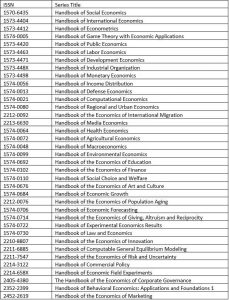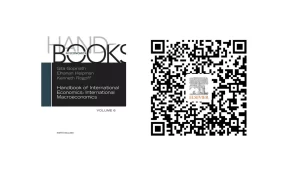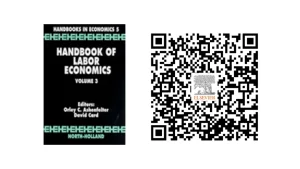ScienceDirect Book Recommendations for College of Business & Public Management
Elsevier has a proud publishing history built on valued partnerships with authors to bring quality products to professionals and institutions throughout the world. Elsevier’s Business & Economics collection focuses on the study of Business, Accounting, Economics, Decision Sciences.
 Handbooks in Economics
Handbooks in Economics
Serial Editors: Steven Durlauf, Rosa L. Matzkin, Sanjeev Goyal
The Handbook in Economics series was founded in 1983 by Kenneth Arrow and Michael Intriligator with the aim of helping economists understand increasingly complex fields and as the series gained popularity and citations, Kenneth and Michael started new subseries to cover all the core subjects in economics. Between 1991 and 2010 the series established one or two new subseries each year, managing to balance the quality of content with the increasing demand for a wider view of the vast array of topics in the field of economics. The Handbooks in Economics playa unique role in collecting, organizing, analyzing and synthesizing advances ineconomic research for graduate students and professionals.
The aim of the Handbooks in Economics series is to produce Handbooks for various branches of economics, each of which is a definitive source, reference, and teaching supplement for use by professional researchers and advanced graduate students. Each Handbook provides self-contained surveys of the current state of a branch of economics in the form of chapters prepared by leading specialists on various aspects of this branch of economics.
Now, The Handbook in Economics series included 40 Series Titles:

 Handbookof International Economics
Handbookof International Economics
Handbook of International Economics provides a definitive reference and teaching supplement for researchers and advanced graduate students. It includes self-contained surveys of the current state of a branch of economics in the form of chapters prepared by leading specialists. These surveys summarize not only received results but also newer developments from journal articles and discussion papers. Some original material is included, but the handbook’s main goal is to provide comprehensive and accessible surveys. While this is a useful reference for professional collections, it’s also a great resource for supplementary readings for advanced courses for graduate students in economics.
 Handbook of Labor Economics
Handbook of Labor Economics
Handbook of Labor Economics Volume 1 brings together a systematic review of the research topics, empirical findings, and methods that comprise modern labor economics. It serves as an introduction to what has been done in this field, while at the same time indicating possible future trends which will be important in both spheres of public and private decision-making. Part I is concerned with the classic topics of labor supply and demand, the size and nature of the elasticities between the two, and their impact on the wage structure. The papers in Part II proceed from the common observation that the dissimilarity in worker skills and employer demands often tempers the outcomes that would be expected in frictionless labor markets. And the last section of the Handbook deals explicitly with the role of institutional structures (e.g. trade unions) that now form an important part of modern labor economics.




